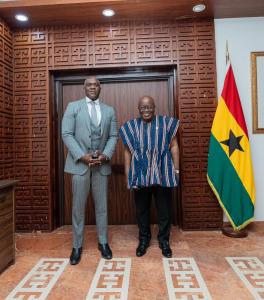Ghana President Akufo-Addo hosted Howard Law Professor John Woods of the Garvey-Nkrumah Development Incubator & Fellowship Program and Garvey-Nkrumah Fellows
— John Woods, Founder of the Garvey-Nkrumah Development Incubator
WASHINGTON, DC, UNITED STATES, September 13, 2024 /EINPresswire.com/ — Ghana President Akufo-Addo recently hosted Howard Law Professor John Woods, founder of the Garvey-Nkrumah Development Incubator and Fellowship Program, as well as Garvey-Nkrumah Fellows at the Jubilee House in Accra, Ghana. Among the topical discussions during this meeting included diaspora-based development as well as the legacies of Marcus Garvey, Kwame Nkrumah, and President Akufo-Addo’s diaspora vision and initiatives that he implemented while serving as President.
The Garvey-Nkrumah Development Incubator, (GNDI), is a cross-cultural development initiative that was founded in support of the African Union’s African Continental Free Trade Area, (AfCFTA), and its global black diaspora economic development objectives. GNDI is a technical assistance, leadership and professional development program aimed at developing economic development capacity throughout the global black diaspora, particularly within the U.S., Africa, and Caribbean regions. The Garvey-Nkrumah Fellowship (GNF) Program is a professional development initiative of GNDI.
The 2024 GNF cohort consists of 20 law and professional students selected from African and Caribbean institutions as well as U.S. Historically Black Colleges and Universities (HBCUs). This cohort represents 8 countries and 14 universities. The Fellows visited Ghana and Rwanda as part of the program’s cultural exchange component.
According to Angela Area Apica, GNF ’24 – Makerere University (Uganda), “The Garvey-Nkrumah Fellowship Program has been highly beneficial to me in a number of ways. Most importantly it opened my eyes to the need for transformation and development in my society.”
During these visits, Professor Woods and the GNF delegation also met with the African Union-African Continental Free Trade Area Secretariat, U.S. Ambassador to Ghana Virginia Palmer, Charge d’Affaires Juliette Babb-Riley – Barbados High Commission to Ghana, Justice Barbara Ackah-Yensu & the Ghana Supreme Court, U.S. Ambassador to Rwanda Eric Kneedler, Rwandan Chief Justice Faustin Ntezilayo, Secretary General Victor Mugabe – Kigali International Arbitration Centre, (Rwanda), Certa Foundation, (Rwanda), Joy Kategekwa – African Development Bank, the African Leadership Academy, as well as the Ghanian and Rwandan Small And Medium-Sized Enterprises, (SMEs), community including the Norrsken House Kigali, a technology incubator located in Kigali, Rwanda.
Fulbright Scholar Award: Professor Woods’ Integrated Pan-African Development (I-PAD) Model
Woods was recently awarded a Fulbright Scholars Award by the U.S. State Department for GNDI and his Pan-African Development (I-PAD) Model. The I-PAD model is an apprenticeship, experiential learning lab that: (1) examines the intersection of development issues concerning Africa, the Caribbean, as well as U.S. urban communities and southern region; and (2) integrates cohorts from the U.S., Caribbean, and African regions who receive professional development in areas such as international law, international trade & development, international business, economic development, public policy, and dispute resolution. This model includes cohorts providing technical assistance as “residents” or interns for global strategic partners such as: the African Union-AfCFTA Secretariat, the U.S. Congress, the Caribbean Union, the Organization of Eastern Caribbean States, law firms, Non-Governmental Organizations, (NGOs), and SMEs.
Ernestine Sellers, GNF ’24 – Norman Manley Law School (Jamaica), states that “the program has significantly reshaped my understanding of development, especially from the viewpoint of developing countries. I am particularly grateful for the opportunity to participate in a space tailored for Africa and the diaspora. Justin Blankson-Phipps, GNF ’24 – Howard University School of Law (U.S.), adds “this program expanded my thoughts on the concept of “development”. Programs, like the Garvey-Nkrumah Program, are essential in making sure the diaspora stays connected and can work together for the ultimate goal of prosperity and unity for all people of African descent”.
Finally, “It was a privilege to be part of this year’s SME cohort and to mentor two exceptional fellows from the Garvey-Nkrumah Program,” said Felicia J. Persaud, founder of ICN Group. “I applaud Professor Woods for initiating this vital program within the Black community, whether in the U.S., Africa, or the Caribbean.”
The AfCFTA and the Need for Targeted Capacity Building
As the fastest growing economy in the world, Continental Africa has embarked on an ambitious development strategy through the AfCFTA. The objectives of the AfCFTA include creating one African market, increasing production throughout Continental Africa, while engaging the global black diaspora as a strategic trade partner. President Akufo-Addo and Prime Minister of Barbados, Mia Mottley have taken the lead both individually and collectively in advancing this economic development approach through strategic initiatives.
According to Professor Woods, “recent history has proven that diaspora based economic development is essential to development.”
Diaspora Based Development: Cultural Connection, Innovation, Alternative Dispute Resolution
Woods maintains that diaspora-based development, a diaspora’s contribution to the economic development of their country of origin or ancestry, is not new and serves as the foundation for recent economic development efforts and growth in countries such as China, India, and Singapore. According to Woods “the tenets of diaspora-based development include remittance, trade, foreign direct investment, as well as knowledge and skills transfer.”
“The challenge is integrating Africa to better foster cultural connectivity throughout the global black diaspora by taking a regional approach to address the disconnection issue,” Woods said. “Moreover, black economies have typically been resource based – cheap labor and resources – and not innovative and/or production based. Consequently, based on socio-economic indicators, black economies are not wealth producing economies which contribute to the global black diaspora disproportionately living in the poorest regions in the world.”
Woods views Ghana, Barbados, and Rwanda as the “Development Triangle” to this diaspora-based approach. “Ghana is the cradle of Pan-Africanism and has continuously guided this approach,” he said. “Barbados, through the leadership of Prime Minister Mottley, has taken intentional steps to facilitate trade between the Caribbean and African regions, which was almost non-existent prior to 2021, including creating a physical presence of High Commissions in Ghana (West Africa) and Kenya (East Africa); Rwanda is a case study in development based on its rise from genocide to becoming one of the strongest economies in Africa and is now positioned to provide best practices for both the African and Caribbean regions.”
clifford franklin
FUSE
+1 314-406-3472
email us here
Visit us on social media:
LinkedIn
Legal Disclaimer:
EIN Presswire provides this news content “as is” without warranty of any kind. We do not accept any responsibility or liability
for the accuracy, content, images, videos, licenses, completeness, legality, or reliability of the information contained in this
article. If you have any complaints or copyright issues related to this article, kindly contact the author above.
![]()







